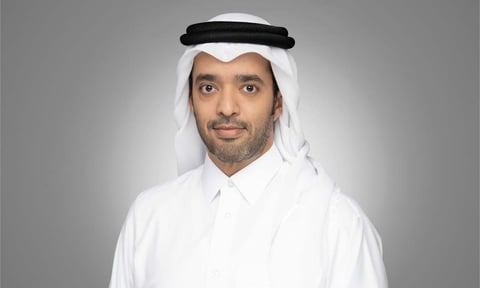First Abu Dhabi Bank (FAB), the largest bank in the UAE and one of the world’s leading and most robust financial institutions, today revealed its commitment to provide over AED500 billion ($135 billion) in sustainable and transition financing by 2030. This includes lending, investments, and facilitation of funds towards sustainable initiatives.
FAB has set an ambitious target, aiming for an 80 percent increase from its 2021 commitment of AED275.4 billion ($75 billion) to reach a total of AED500 billion ($135 billion) in sustainable financing.
This commitment stands as the largest sustainable finance pledge made by any bank in the MENA region thus far. Furthermore, FAB’s commitment accounts for over half of the collective AED1 trillion ($270 billion) pledge made by UAE banks towards sustainable finance, as announced by the UAE Banks Federation on Finance Day during COP28.
Read more: UAE national banks green finance agenda in support of COP28, net-zero 2050
As part of FAB’s announcement at the UN Climate Change Conference (COP28), the bank will expand its target to include transition financing projects and early-stage innovative climate solutions.
This expansion demonstrates FAB’s dedication to play a pivotal role in advancing the regional sustainable finance agenda and its ability to adapt to evolving customer and community needs.
More ambitious sustainable finance targets by 2030
His Highness Sheikh Tahnoon bin Zayed Al Nahyan, chairman of FAB, said “FAB is deeply integrated into the UAE’s ambition on climate change and net zero, placing sustainability at the heart of social and economic progress. Across the Group, we believe in the urgency to scale investments and financing, as the foundation of climate action. In setting even more ambitious sustainable finance targets by 2030, we are expanding our commitment. Our objectives will accelerate the decarbonisation journey, while supporting the UAE vision and regional, and global net zero agenda.”
Unlocking 80 percent more resources for transition finance
Hana Al Rostamani, Group chief executive officer of FAB, said: “The UAE has shown us this week what it means to be ambitious, bold and collaborative in its leadership of climate change action for our region and our world. We mirror its desire to accomplish the unprecedented and unlock 80 percent more resources for transition finance. Our new target is a floor and not a ceiling.
“From now until the end of this decade, we will deliver meaningful impact by deploying finance, advisory, and innovation at scale to ensure we meet climate ambitions across the region, where we will support more sustainable projects, engage more clients in their transition journeys, and advance the UAE’s development as a green finance hub,” Al Rostamani added.

Significant contributions
FAB, as a leading bank in climate action within the region, has made significant contributions to sustainable finance, generating positive impacts in the UAE, the broader MENA region, and globally. Since 2021, it has facilitated over AED100 billion ($27 billion) in sustainable projects by the end of September 2023.
These projects encompass various sectors such as renewable energy, clean transportation, green buildings, and social initiatives. Notable accomplishments include three solar-energy projects that effectively offset nearly two million tons of CO2 emissions annually, equivalent to the energy consumption of 250,000 households. Additionally, FAB has been involved in the development of seven green buildings with Estidama 2 pearl design ratings, as well as a wastewater plant that treats 430,000 m3 of wastewater daily.
Transition financing
FAB’s expanded portfolio will encompass transition financing, which plays a critical role in supporting industries that face challenges in reducing their environmental impact, such as heavy, extractive, and hard-to-abate sectors. This expansion will complement FAB’s existing green financing initiatives. Additionally, the bank will focus on early-stage innovative solutions to address climate change, including the exploration of hydrogen technologies.
Since 2021, FAB’s sustainable green finance projects have been geographically diversified. Approximately 57 percent of the projects are based in the UAE, followed by 21 percent in Saudi Arabia, 11 percent in Singapore, 5 percent in Bahrain, and the remaining projects spread across Europe, the Americas, and South Asia. Of the total financing, over 86 percent has been disbursed through conventional financing, while 14 percent has been provided through Islamic financing methods.

Sustainability milestones
FAB continues to achieve significant sustainability milestones, with the latest being the announcement of their enhanced target. In October 2021, FAB became the first bank in the Gulf Cooperation Council (GCC) to commit to achieving net zero emissions by 2050 by joining the industry-led and UN-convened Net Zero Banking Alliance (NZBA).
Furthermore, FAB has been at the forefront of sustainable finance in the MENA region. In 2017, it made history by becoming the first MENA bank to issue a green bond. Since then, FAB has emerged as a regional and global leader in the Green Bond and Sukuk market. With a total of 15 issuances across 6 different currencies, FAB has outstanding Green Bonds and Sukuk worth over AED11.75 billion ($3.2 billion) equivalent. These achievements highlight FAB’s commitment and leadership in promoting sustainable financial instruments and contributing to the growth of the green finance market.
For more news on sustainability, click here.




